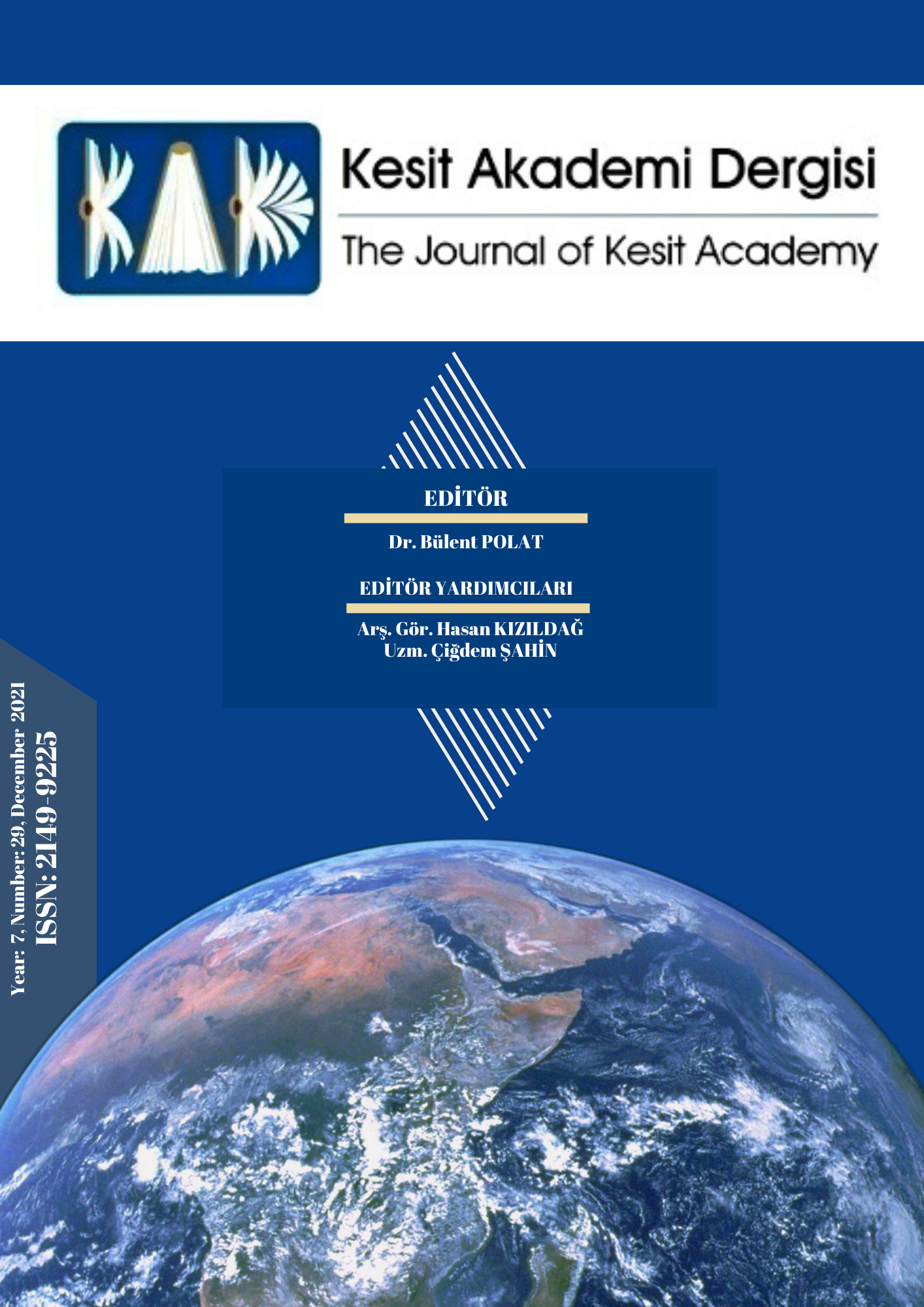Author :
Abstract
İnsanoğlu yaşamı boyunca anlam arayışı içerisinde olmuş; hem biyolojik hem de ruhsal yapısı ile bir bütün olan insanın bu anlam arayışı da hem maddi hem de manevi alana yönelik çabalar içermiştir. Zaman zaman farklılaşsa da özgüven ve değer algısı ve ilişkisi bu noktada önemli bir yer tutmuş, insan davranışlarında belirleyici rol oynamıştır. Modern dönemde insan hayatında değişen birçok husus gibi özgüven ve değer algısı da değişime uğramış, bu değişim sonucunda ortaya çıkan ilişki toplum katmanlarını oluşturan bireyler arasında zaman zaman çatışmaya neden olmuştur. Toplumun genç, dinamik ve göreceli olarak eğitimli kısmını oluşturan gençliğin bu noktadaki algı ve düşüncelerinin bilinmesinin önemli olacağı düşünülmektedir. Bu amaçla makalede sosyo-demografik değişkenler ile İnsanî Değerler Ölçeği ve Özgüven arasındaki ilişki ve farklılaşma araştırılmış, Kahramanmaraş Sütçü İmam Üniversitesi İlahiyat Fakültesi öğrencilerinden oluşan örneklem üzerinde konu incelenmiştir. Yapılan araştırma ile tesadüfi yöntemle belirlenen 123’ü erkek (%47,9) ve 134’ü kız (%52,1) toplam 257 katılımcıdan oluşan örneklem grubunun özgüven algıları ve insani değer tutumları hakkında düşünceleri tespit edilmeye çalışılmıştır. Araştırmada Frekans ve ANOVA testinden yararlanılmış olup, verilerin değerlendirilmesinde ve değerlerin bulunmasında SPSS 16.0 istatistik paket programı kullanılmıştır. Araştırma sonucunda, sosyo-ekonomik durum, anne-baba birliktelik durumu, aile dindarlığı ve öznel dindarlık algılarının özgüven ve insani değerler arasındaki tutumlarında etkili olduğu tespit edilmiştir.
Keywords
Abstract
Mankind has been in search of meaning throughout his life; This search for meaning of man, who is a whole with his biological and spiritual structure, also included efforts for both material and spiritual areas. Although it differs from time to time, self-confidence and the perception and relationship of value have an important place at this point and played a decisive role in human behavior. Self-confidence and the perception of value have also changed, like many aspects that have changed in human life in the modern era, and the relationship that emerged as a result of the change has caused conflict from time to time between the individuals who make up the layers of society. It is thought that it will be important to know the perceptions and thoughts of the youth, who constitute the young, dynamic and relatively educated part of the society. For this purpose, the relationship and differentiation between socio-demographic variables, Human Values Scale and Self-Confidence were investigated in this article, and the subject was examined on a sample consisting of Kahramanmaraş Sütçü İmam University Faculty of Theology students. With the study, it was tried to determine the thoughts about self-confidence perceptions and human value attitudes of the sample group consisting of 257 participants, 123 male (47.9%) and 134 female (52.1%) randomly determined at Kahramanmaraş Sütçü İmam Faculty of Theology. Frequency and ANOVA tests were used in the research, and SPSS 16.0 statistical package program was used to evaluate the data and find the calculated values. As a result of the research, it was determined that socio-economic status, parental relationship status, family religiosity and subjective religiosity perceptions were effective in their attitudes between self-confidence and human values.
Keywords
- Acar, M. C. (2019), öz güven ile dindarlık arasındaki ilişki üniversite öğrencileri üzeri- ne bir araştırma. Bingöl Üniversitesi İlahiyat Fakültesi Dergisi, 14, 64-78.
- Akarsu, B. (1998). Felsefe terimleri sözlüğü. İnkılap Kitabevi.
- Akbaba Altun, S. (2003) Eğitim yönetimi ve değerler. Değerler Eğitimi Dergisi, 1/1, 7-18.
- Akın, A. (2007). Özgüven ölçeğinin geliştirilmesi ve psikometrik özellikleri. Abant İzzet Baysal Üniversitesi Eğitim Fakültesi Dergisi, 7/2, 167-176.
- Aktan, C.C. & Şen, H. (2015). Globalleşme ve Türkiye. Mercek Dergisi, 6/21, 104-112.
- Aydın, M. (2003). Gençliğin değer algısı. Değerler Eğitimi Dergisi, 1/3, 121-144.
- Aydın, M. (2011). Değerler, işlevleri ve ahlâk. Eğitime Bakış, 7/19, 39-45.
- Aydınlı, O. (2007). İlk Müslüman toplum inşasında özgüven faktörü ve Rıdvan Biatı‛. İslami İlimler Dergisi, 431-442.
- Beyoğlu, A. (2015). Sanat eğitiminde algı, görsel algı ve yanılsama: Victor Vasarely’nin çalışmaları üzerine bir inceleme. Trakya Üniversitesi Sosyal Bilimler Dergisi, 17/1, 331-348.
- Bilgin, O. (2011). Ergenlerde Özgüven Düzeyinin Bazı Değişkenler Açısından İncelenmesi [Yayımlanmamış Yüksek Lisans Tezi]. Sakarya Üniversitesi.
- Cevizci, A. (1999). Felsefe sözlüğü. Paradigma Yay.
- Coşkun, A. (2003). Din ve kimlik. Marmara Üniversitesi İlâhiyat Fakültesi Dergisi, 24/1, 5-
- Çetintaş, İ. (2014). İslam düşüncesinde değerler metafiziği. Elis Yay.
- Çınar, F. (2019). Gençlik değerler ve bağımlılık profilleri üzerine bir araştırma. Süley- man Demirel Üniversitesi İlahiyat Fakültesi Dergisi, 2/43, 164-186.
- Çoban, M. (2016). Değerler eğitiminin referansları bağlamında Hacı Bektaş-ı Velî’nin Makâlâtı. Sütçü İmam Üniversitesi Sosyal Bilimler Dergisi, 13/1, 1-22.
- Dilmaç, B. (2007). Fen lisesi öğrencilerine insani değerler eğitimin verilmesi ve insani değerler ölçeği ile sınanması *Yayımlanmamış Doktora Lisans Tezi]. Selçuk Üniversitesi.
- Doğan, D. M. (1996). Büyük Türkçe sözlük. İz Yay.
- Güngör, E. (1998). Değerler psikolojisi. Ötüken Neşriyat.
- Kahramanmaraş Sütçü İmam Üniversitesi. (2018). 2018-2022 Stratejik planı.
- Kate, B. & Binley, P. (2006). Building confidence for dummies. John Wiley & Sons.
- Kaymakcan, R. & Meydan, H. (2014). Ahlak ve değerler eğitimi. Dem Yayınları.
- Kırık, A. M. & Sönmez, M. (2017). İletişim ve mutluluk ilişkisinin incelenmesi. İNİF e- dergi 2/1, 15-26.
- Koyuncu Ş., M. (2015). Okul öncesi öğretmenlerinin öz güvenleri ve mesleki tutumlarının incelenmesi [Yayımlanmamış Yüksek Lisans Tezi]. Kocatepe Üniversitesi.
- Köse, A. (2016). Değer ve siyaset ilişkisi: 22 Temmuz 2007 seçimi üzerine bir değer ana- lizi. Karadeniz Teknik Üniversitesi İletişim Araştırmaları Dergisi, 3/12, 2-19.
- Kurt; A.O. & Göler, M.E. (2017). Anadolu’da ilk tapınak: Göbeklitepe. Cumhuriyet İlahi- yat Dergisi,21/2, 1107-1138.
- Marshall, G. (2014). Sosyoloji sözlüğü (Çev.: O. Akınhay ve D. Kömürcü). Bilim ve Sanat Yay.
- Türk Dil Kurumu Sözlükleri. 20 Ocak 2021. http://tdk.gov.tr
- Usta, A. (2018). Aydınlanma düşüncesine kısa bir bakış. Kastamonu İletişim Araştırmaları Dergisi, 1, 74-90.
- Ülken, H. Z. (1996). Sosyoloji sözlüğü. Milli Eğitim Basımevi.





